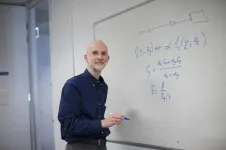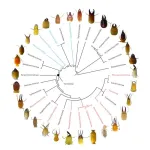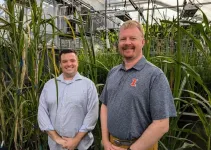(Press-News.org) WEHI’s Bioinformatics division head, Professor Gordon Smyth, has won the 2024 Eureka Prize for Excellence in Research Software.
The award recognises Prof Smyth’s lead role in developing and designing the limma software package, which helps researchers detect changes in gene activity.
limma has helped researchers around the world detect changes in gene activity – a crucial element to finding new treatments for a range of diseases, like cancer – and has been used or cited in more than 70,000 published papers worldwide.
The Australian Museum Eureka Prizes are among Australia’s most distinguished science awards, honouring excellence across the areas of research and innovation, leadership, science engagement, and school science.
At a glance
Professor Gordon Smyth has won the 2024 Eureka Prize for Excellence in Research Software.
The award recognises his lead role in developing the limma software package, a leading tool used by researchers across a range of fields to detect changes in gene activity. The software has been used or cited in more than 70,000 published papers worldwide.
Understanding how genes behave is key to finding new treatments for diseases including cancer and diabetes.
A team effort
Prof Smyth joined WEHI in 2001, the year the sequencing of the human genome was published, and started work on limma soon after.
Modern genomic technologies produce a vast amount of data for researchers to examine – which is where limma comes in. The software uses statistical methods to handle these massive, complex datasets, with its robust methods and ease of use making it a widely adopted tool in the genomic community.
“My team here at WEHI have, for many years, been developing the advanced computational and statistical strategies to help analyse and interpret these huge genomic datasets, headlined by limma,” said Prof Smyth.
“Our goal is ultimately to learn more about how diseases originate by examining genetic disruption and how this can be controlled – while freely providing the tools we develop to others around the world so they can do the same.”
Prof Smyth said he was thrilled to win the Eureka Prize for Excellence in Research Software, which was the result of a team effort over many years.
“I would particularly like to mention my WEHI colleagues Professor Matt Ritchie, Dr Belinda Phipson and Dr Charity Law, who made significant contributions to important limma functionalities early on and who continue to be involved in the limma project,” he said.
Solving genetic puzzles
Understanding how genes are turned on or off, a process called gene expression, is an essential part of disease research.
By comparing, for example, how genes are expressed in healthy and diseased samples, scientists can identify genes that cause diseases like cancer, diabetes and neurological disorders, opening the door to new treatments and therapies.
Bioinformatics applies mathematics, statistics and computer science to make sense of complex biological data and systems. limma is the leading software package used in bioinformatics for statistical analysis of gene expression, and is downloaded half a million times each year.
“Software development is fundamental for modern research but has not always been fully recognised or rewarded – it is fantastic that the Australian Museum and the Australian Research Data Commons have created this prize to highlight its critical importance in driving discovery and innovation.,” said Prof Smyth.
The Eureka Prizes were announced at a ceremony in Sydney on Wednesday 4 September.
The award is the latest recognition of the significant contributions Prof Smyth has made to the fields of bioinformatics and computational biology, in a career spanning over two decades.
Prof Smyth was named an Honorary Senior Fellow of the Australian Bioinformatics and Computational Biology Society (ABACBS) in 2020, the society’s highest honour, was elected a Fellow of the Australian Academy of Science in 2021 and was awarded the Julian Wells Medal in 2023. He was won several software development awards and has been a Web of Science Highly Cited Researcher every year for over a decade.
Professor Smyth’s research has received significant support from the Australian National Health and Medical Research Council and the Chan Zuckerberg Initiative.
END
WEHI bioinformatician wins prestigious Eureka prize
2024-09-05
ELSE PRESS RELEASES FROM THIS DATE:
The dictionary of termites has been rewritten
2024-09-05
Termites have a bad reputation. Most think of them as pests, a status that isn’t helped by their recent reclassification into the cockroach family.
But not only do the termites that cause serious problems for humans only make up 3.5% of all termite species, termites also serve as crucial ecosystem engineers, maintaining the infrastructure of various environments. Like earthworms, they circulate nutrients by decomposing plant materials, and they play the important role of bioturbators: much like plowing a field, termites aerate the soil, expose underground nutrients, and let water infiltrate deeper layers of soil – ...
CABBI team designs efficient bioenergy crops that need less water to grow
2024-09-05
Drought stress has long been a limiting factor for crop production around the world, a challenge exacerbated by climate change.
For more than a century, scientists have targeted a key plant trait known as water use efficiency (WUE) to help crops grow with less water and avoid suffering from drought stress. Greater WUE can help plants avoid drought stress — but for most crops it’s also associated with lower productivity when water is plentiful.
In a pair of new studies published in the Journal of Experimental Botany, ...
Texas A&M researchers discover that sustained neck exertions change the spine and muscles, causing pain
2024-09-05
Learning new languages, sending emails, attending a virtual class, or speaking to loved ones halfway around the world are just some of the tasks accomplished by touching a button on a smartphone. Unfortunately, the ease and convenience of modern devices have also come with a painful crick in the neck. The sedentary nature of work and prolonged use of hand-held devices and computers have contributed to a sharp increase in neck pain.
While fatigue in neck muscles has long been suspected of causing pain, the actual mechanical changes in the spine and muscles that precede weakness remain an outstanding question.
Now, using high-precision X-ray ...
Air pollution linked to higher risk of infertility in men
2024-09-05
Long term exposure to fine particulate matter (PM2.5) air pollution is linked to a higher risk of infertility in men, whereas road traffic noise is linked to a higher risk of infertility in women over 35, finds a Danish study published by The BMJ today.
If these findings are confirmed in future studies, they could help guide strategies to regulate noise and air pollution to protect the general population from these exposures, say the researchers.
Infertility is a major global health problem affecting one in seven couples trying to conceive.
Several ...
Prostate cancer rates across Europe since 1980 “indicative of overdiagnosis” say experts
2024-09-05
Rates of prostate cancer across Europe since 1980 are “indicative of overdiagnosis”, say researchers in a study published by The BMJ today.
Overdiagnosis refers to the detection of harmless cancers that are unlikely to cause symptoms or death during a patient’s lifetime, which can lead to unnecessary treatment, negative impacts on quality of life, and wasted healthcare resources.
The findings show rapid increases in the number of new cases (incidence) in parallel with uptake of so far predominantly opportunistic ...
Children switch to walking and cycling to school after introduction of London’s Ultra-Low Emission Zone
2024-09-05
Four in ten children in Central London who travelled to school by car switched to more active modes of transport, such as walking, cycling, or public transport, following the introduction of the Ultra-Low Emission Zone (ULEZ), according to new research. In the comparison area with no ULEZ, Luton, only two in ten children made this switch over the same period.
Car travel contributes to air pollution, a major cause of heart and lung diseases including asthma attacks. Beyond this, it limits children's opportunities for physical activity, hindering their development and mental health, and increasing their risk of obesity and chronic illnesses.
Despite ...
Three top ways to stop smoking
2024-09-05
A major new scientific review of evidence published in the journal Addiction has identified three top strategies for quitting smoking:
Varenicline -- a prescription drug sold under the brand names Chantix and Champix among others.
Cytisine -- a plant-based compound available under prescription in the United Kingdom, in Canada as an over-the-counter natural health product (Cravv®) and throughout central and eastern Europe.
Nicotine e-cigarettes.
These work best when combined with behavioural support, ...
Scientific review reveals top three effective ways to stop smoking
2024-09-05
A major new review of evidence by a team of scientists, including a University of Massachusetts Amherst public health researcher, has identified the three best strategies for quitting smoking:
Varenicline – a prescription drug sold under the brand names Chantix and Champix, among others.
Cytisine – a plant-based compound not widely available in the U.S. but sold as an over-the-counter natural health product (Cravv®) in Canada and throughout Central and Eastern Europe, and available under prescription in the United Kingdom.
Nicotine e-cigarettes.
The review, published ...
HudsonAlpha researchers awarded NIH grant to identify genetic contributors to rare diseases in children
2024-09-05
As genetic sequencing technology becomes more accessible and efficient, researchers have made significant strides in understanding the genetic underpinnings of various diseases. This knowledge has led to a surge in clinical applications of genetic testing, offering hope and improved outcomes for individuals affected by many genetic diseases and disorders. Despite these successes, scientists continue to try to improve genetic testing technologies, because many individuals with rare diseases remain undiagnosed even after current state-of-the-art genomic testing.
Scientists at the HudsonAlpha Institute for Biotechnology ...
The signals in your brain that tell you when It’s time to move
2024-09-05
A new study, published in Nature Communications this week, led by Jake Gavenas PhD, while he was a PhD student at the Brain Institute at Chapman University, and co-authored by two faculty members of the Brain Institute, Uri Maoz and Aaron Schurger, examines how the brain initiates spontaneous actions. In addition to demonstrating how spontaneous action emerges without environmental input, this study has implications for the origins of slow ramping of neural activity before movement onset—a commonly-observed but poorly understood ...


